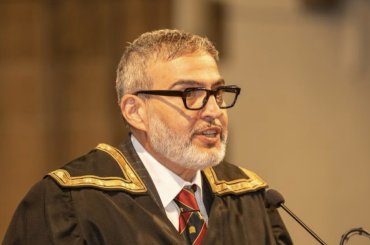Today’s election in the Democratic Republic of Congo is already collapsing under the weight of massive fraud. Reporters who visited Limete, an opposition stronghold in the capital, Kinshasa, reported that no voting materials had been delivered all morning, while long lines waited patiently. Even before the vote, the Joseph Kabila regime had banned voting outright in three other opposition areas, falsely claiming that an outbreak of ebola in one of them made voting unsafe. A Washington Post editorial two days ago had already accurately called the election “a travesty,” citing Kabila’s “chicanery,” “repression,” “subterfuge,” and “electoral flimflam.”
But if the mainstream news coverage is typical, the reports will be centered on Africans, with the implication that once again they have failed the test of democracy.
The implication is false. Of course President Kabila and his entourage are partly responsible for the disaster. But they share blame with non-Congolese, including:
* Dan Gertler, the Israeli businessman who has partnered with Kabila over mining concessions in the mineral-rich central African nation. Gertler is so corrupt that even the Trump administration had to sanction him under the Magnitsky anti-corruption act — although Israel, where he actually lives, so far has done nothing.
* An Anglo-Swiss mining multinational, Glencore, that teams up with with Gertler and Kabila in looting the Congo’s extensive cobalt and copper deposits
* U.S. banks, including Citicorp and Bank of America, whose loans keep Glencore humming along
* A well-connected Washington, D.C. public relations/lobbying firm, Sanitas International, that orchestrated a surprisingly successful campaign to manipulate certain U.S. journalists who parachuted in to interview Kabila (I described the media malpractice in The Nation.)
* Successive governments in the the U.S. and Europe that have admonished Kabila occasionally, but refuse to apply stronger pressure because they favor what they think will be stability over justice. They now face a moment of decision; do they let Kabila steal the election and shoot down pro-democracy protesters?
What is inspiring about today’s events is that Congolese showed up to vote en masse, even though they all know the election is rigged. The turnout follows weeks in which thousands flocked to rallies for the two leading opposition candidates, risking police gunfire in some cases to show their support. The respected Congo Research Group released an election eve poll that showed the two, Martin Fayulu and Etienne Tshisekedi, both trouncing Kabila’s stand-in, a nonentity named Emmanuel Ramazani Shadary.
“All Congolese know that a free and fair election is impossible,” Kambale Musavuli, an energetic young Congolese who works with the US-based solidarity group, Friends of the Congo, explains. “But they collectively decided not to boycott anyway. And then they chose to use the election campaigns as a chance to mobilize and engage politically — to an extent that is surprising everybody.”
One theme was common in mainstream media coverage; as the BBC put it, that this election would mark “the first peaceful transfer of power since independence in 1960.” Some amnesia is at work here. The Congolese did vote freely back then, electing a principled and courageous man named Patrice Lumumba to be their prime minister. Right away, the U.S. Central Intelligence Agency and Belgium, the departing colonial power, plotted against Lumumba, helping to depose him after just months and then having him brutally murdered the following year.



UPDATE:
“DR Congo election: Internet shut down after presidential vote” | BBC.com | Dec. 31 2018
The internet has been shut down in key cities in the Democratic Republic of Congo a day after the much-delayed presidential election.
ENTIRE ARTICLE – https://www.bbc.com/news/world-africa-46721168
■ THE GUARDIAN:
https://www.youtube.com/watch?time_continue=2&v=VBeIj2TczK0
What is inspiring about today’s events is that Congolese showed up to vote en masse, even though they all know the election is rigged.
http://www.siyasat.pk/
People reading this article might be surprised to know that Canada played an important part in the capture and murder of Patrice Lumumba. This is revealed in Yves Engler’s book “Canada In Haiti: 300 Years Of Aid And Exploitation.”